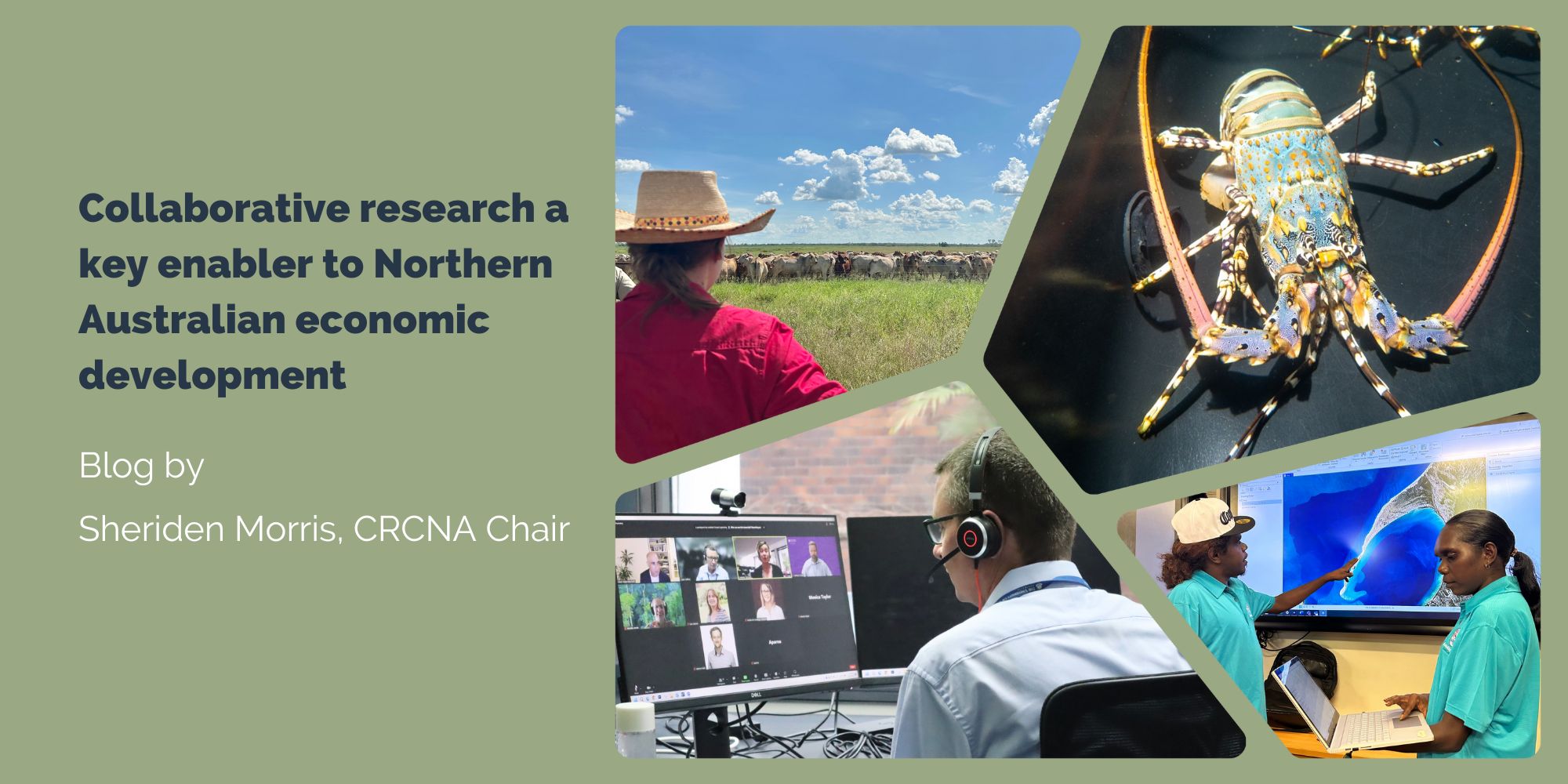Collaborative research a key enabler to Northern Australian economic development

The Cooperative Research Centre for Developing Northern Australia (CRCNA) is again proud to support the 2023 Developing Northern Australia Conference and is excited at the opportunity to showcase our research partnerships across Northern Australia.
Since 2017, we’ve funded 95 industry-led research collaborations, valued at $145 million in CRCNA cash investment and partner contributions. Our work in Northern Australia spans across the key sectors of agriculture including aquaculture, horticulture, viticulture, health service delivery and Traditional Owner-led business. To deliver our projects, we’ve partnered with private industry, local, state and territory governments, international experts, research institutions and corporations, regional and economic development entities and First Nations organisations in a truly collaborative vision to deliver for Northern Australia.
By encouraging collaboration and partnership across industries and jurisdictions, our research helps to de-risk future investment in the region and ensure that the right kind of research is being undertaken to address the challenges and opportunities specific to Northern Australia. This is particularly important given that development in Northern Australia is a contested space, with tensions between economic development, First Nations aspirations, environmental and cultural protections.
Our investments in projects specifically examining these complexities have made significant strides towards unlocking the region’s potential. For example, in the Northern Territory, our De-risking NT through sustainable development project with the Department of Industry, Tourism and Trade is shaping up to be highly influential in supporting agricultural development in the Top End. A core part of this project is to support the NT Government in identifying areas suitable for large-scale agricultural development, known as precinct areas. Twelve (12) precincts have been identified through a process of multi-criteria analysis which included technical data across soil and water and access to logistics routes. The purpose of precinct planning is to provide de-risked land that is investment ready and suitable for purpose. This project has directly informed and influenced additional CRCNA investments in the Douglas Daly region, including the Northern Australia Water Security project with the Northern Australian Universities Alliance and collaborations with the National Environmental Science Program (NESP) Marine and Coastal Hub (Project 3.1 and Project 3.4), and the Threatened Species Recovery Hub (Project 7.9).
In 2023, the CRCNA launched our largest research and development investment to date, with the Cotton, Grain and Cattle (CGC) integrated production system development program getting underway in northern Queensland, Katherine and the Douglas Daly regions in the Northern Territory and the Ord/ Kununurra region in northern Western Australia. The CGC program includes six projects and 30 research partners looking to maximise the productivity of cropping and cattle production systems. As another example of our deep connections to industry, we’ve co-invested in this program with two national Research and Development Corporations – the Cotton RDC and Grains RDC. These projects will redefine what’s possible in the north and create new and more resilient economic opportunities for future generations.
Aquaculture is also shaping up to be one of the most important emerging sectors in Northern Australia, especially for First Nations communities. Our baseline assessment of this opportunity, completed in 2020, suggested more than 2300 new, direct jobs will be generated in northern-based aquaculture in the next decade. We’ve already seen the seeds of this success when the Yagbani Aboriginal Corporation debuted their Arafura Oysters at an industry event at the Darwin Oyster Bar, on the sidelines of a global aquaculture conference in May 2023. This was the culmination of many years of research, development and extension with the Darwin Aquaculture Centre – work that has been refined and continued with funding from the CRCNA. The CRCNA has also recently invested an additional $2.4 million in expanding this work in Blacklip Rock Oysters across the Top End and new work examining breeding techniques to produce Black Jewfish. Tropical Rock Lobsters are also a focus area for the CRCNA, with our investment in Sea Raft Research (Ornatas) enjoying significant success to date as they progress towards up-scaling current operations at their Toomulla site, north of Townsville. In the past 18 months, they have hired more than 20 full-time staff and injected significant capital investment into infrastructure.
When it comes to investing in health services development, the CRCNA takes pride in our novel projects and the role our work plays in supporting the development of the northern health workforce. This year we kick off two unique virtual programs, aimed at connecting healthcare workers across the region to their peers and subject matter experts. The Telehealth Skills Extension for Community Health Outcomes (ECHO) and the Health eMinds ECHO provide free, online mentoring sessions on a range of practical topics. Our aim is to improve equity and access to healthcare by creating a community of best practice for healthcare professionals and workers in the north. As part of this work, we will also deliver a series of practical, face-to-face workshops on telehealth skills in locations across the north, thanks to our partners the Centre for Online Health at the University of Queensland. This will include a session following the Developing Northern Australia conference in Darwin on 27 July 2023.
This year at the CRCNA we reaffirmed our commitment to First Nations economic development by funding $5 million in projects seeking to activate the Indigenous Estate. Activating the Indigenous Estate means ensuring our First Nations people participate in and directly benefit from the economic opportunities identified through our research and workforce development programs. An example of one of our latest collaborations is our new investment with Anindilyakwa Land Council (ALC), Geoscience Australia, the Australian National University and Aerometrex to transform how digital maps are designed and used on Country. The ALC are undertaking an ambitious plan to map their entire island archipelago with support, as a key enabler for long-term economic development for Northern Australia’s First Nations’ communities.
As part of the Integrating Indigenous priorities in spatially enabled planning of the Indigenous Estate, Aerometrex are supporting the field data collection and the ANU will assess how new ways of using GIS technology can improve the end-user experience for the ALC. Importantly, a ground-up approach will ensure traditional knowledge and information is integrated into the GIS in culturally appropriate and inclusive ways. Geoscience Australia will also explore how their data products and data sets can be utilised by the project to enrich and improve the process of accessing and using the technology in remote locations.
It’s hoped this model will support other remote First Nations communities to take up GIS mapping as a way of ensuring traditional information and knowledge is managed in a best-practice context.
The CRCNA is a critical initiative in the developing Northern Australia agenda which is helping to de-risk future investment and ensure continued collaboration across sectors and jurisdictions in the north and across the nation. By bringing together industry, research organisations, and government agencies, the CRCNA is driving innovation and competitiveness in the region, unlocking its untapped potential, and building the skills and capacity of communities in the region. It is vital that we continue to support and invest in initiatives like the CRCNA to ensure that Northern Australia continues to develop as a dynamic, prosperous, and sustainable region for generations to come.
By Sheriden Morris, CRCNA Chair



